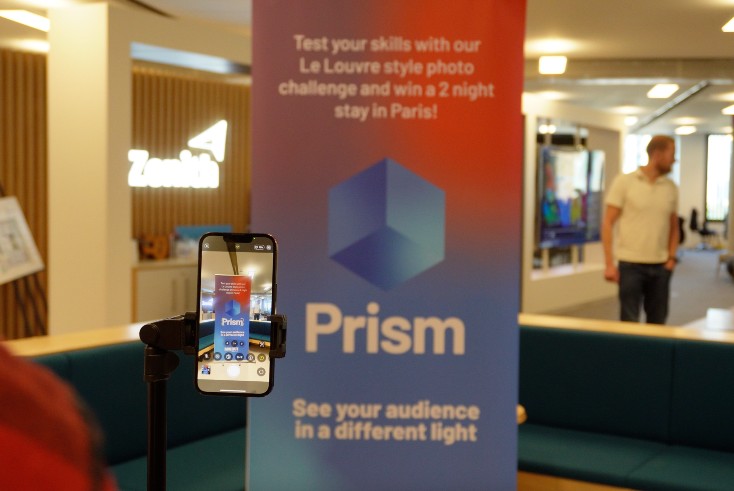Immediate Media launches Prism first-party data solution

Immediate Media has launched a full-scale first-party data solution.
Prism features a suite of solutions including planning, research and insight. It also incorporates new audience and contextual capabilities, such as advanced targeting options, data matching and modelling, and contextual targeting.
Within Prism, advertisers will be able to track campaign performance, measure return on investment and optimise future campaign strategies based on performance insights across Immediate’s ad inventory.
Immediate’s portfolio includes a number of premium consumer brands, including Good Food, Radio Times, HistoryExtra and BBC Gardeners’ World Magazine. The publisher says its total UK audience sits at 21m users a month.
Redefining first-party data
Immediate first launched a data solution in 2017, when it was among the first publishers to market its first-party data. That original offering was built around targeting based on audience insights, but was considerably more narrow in focus than Prism.
Matthew Rance, head of commercial data and analytics at Immediate, told The Media Leader that Prism has been built to provide a “much more extensive proposition”.
“We’re trying to rethink how we define first-party data,” Rance said, adding that simply owning first-party data “isn’t going to be enough” for publishers to compete. Rather, they will need to get “clever”, “shrewd” and “industrious” with how such first-party data is leveraged in additional solutions.
Prism incorporates Immediate’s original audience offering but also adds contextual targeting capabilities, new data matching capabilities and broader insight and trend-based analysis capabilities.
According to Rance, the next-generation contextual offering “is a really important part” of Prism, as it broadens the type of targeting advertisers are capable of doing.
“Contextual is often confusingly framed as the opposite of data. You either do audience targeting or you do contextual,” said Rance. “Now, they’re really two sides of the same coin.”
With Prism, Immediate can also make predictions — based on the context of what is on the page — on what a reader might be most likely to interact with, even if Immediate had no prior data on that individual.
Comparing targeting to a funnel, Rance said Prism now offers both granular and broad targeting, contextual targeting and the “final layer” of predictions, giving clients the ability to choose how they want to use first-party data.
Meanwhile, trend-based analysis capabilities were already being used internally by the publisher to aid in content strategy, such as by helping to signal which trends are worth producing articles on. Offering similar tools to advertisers thus made sense.
Rance explained: “If all of this [data] is used by us to understand our audience and build great content based on the passion points people have […] if we’re doing that all the time, then why don’t we try and work towards a place in which we do exactly the same for our advertisers?”
Collaboration needed?
First-party data solutions have become increasingly important, given advertisers’ demand for high-quality data amid a gradual turn away from third-party cookie-based targeting solutions.
Alexis Faulkner, chief transformation officer at Mindshare UK, told The Media Leader that such data solutions are interesting as long as “the data is accurate, refreshed regularly and differentiated”, but publishers offering first-party data solutions have a challenge in that “they are competing with Meta and Google, who have huge scale and reach as well as data”.
“As agencies, we need to find operational and cost-effective ways to target audiences that don’t invade people’s privacy,” Faulkner continued. “Solutions are rarely available with large reach or in a way that is operationally scalable, so [they] don’t always have the impact a publisher may hope for.”
When asked whether Immediate could offer sufficient scale to compete with tech giants, Rance said: “Scale is important. We need to be able to meet the demand and deliver the KPIs that they have. But we are a big set of brands. We can often meet that demand on a direct one-to-one basis. And we do have that uniqueness when it comes to data. We have insight that no-one else really has.”
He added that “collaboration will continue to be a very important component for publishers”, especially around the pooling of first-party data. Some publishers, such as The Independent, have looked to pursue partnerships to pool data regarding their online audiences to create a more attractive sell to advertisers through increased scale and reach. Earlier this year, the Indy inked one such partnership with BuzzFeed.
The Independent’s CEO eyes publisher partnerships beyond BuzzFeed
“If you’d have asked publishers this five years ago, they’d have been less open to the idea,” continued Rance. “Data specifically is going to be the most prominent aspect that is used as a collaboration component.”
Rance suggested that there are “parts” of Prism that Immediate would consider offering in a collaborative form and that he would expect other publishers to consider doing the same for their own first-party data solutions.



